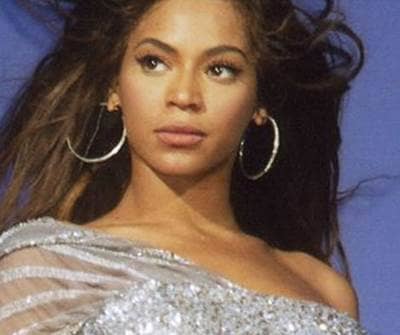
Who run the board meeting? Beyoncé.
After dropping her black empowerment anthem “Formation,” the pop star is preparing to embark for her first world tour since 2014. The world tour will be yet another addition to the superstar’s already-impressive CV, which includes five solo albums, 20 Grammy Awards and 53 nominations, a net worth of $250 million in 2015, and serving as the founder, president, and CEO of her own company, Parkwood Entertainment.
One thing is clear: Beyoncé is a Flawless businesswoman. Rolling Stone’s Rob Sheffield dubbed her success the “Beyoncé Philosophy, which basically boils down to the fact that Beyoncé can do anything the hell she wants to.”
Beyoncé certainly can get away with what most artists can’t. She dropped an album that debuted at No. 1 on the U.S. Billboard charts without any promotion. She nabbed the much-coveted cover of the September issue of Vogue without consenting to an interview. And she can turn Coldplay’s halftime performance at the Super Bowl into her show.
We've looked at Queen B's corporate strategy to pull out the big lessons execs and managers everywhere can learn on how to remain in control of your company — even when investor pressure and bad press is dragging you down — to bring your career to the top of the charts.
Lesson #1: Involve yourself in decisions big and small
Beyoncé started her own company, Parkwood Entertainment in 2013, to have complete control over her brand.
“When I decided to manage myself it was important that I didn’t go to some big management company,” she said in 2013 during a private screening of New York’s School of Visual Arts Theatre, per Billboard. “I felt like I wanted to follow the footsteps of Madonna and be a powerhouse and have my own empire and show other women when you get to this point in your career you don’t have to go sign with someone else and share your money and your success—you do it yourself.”
And she’s truly done it herself. She apparently has her hands in nearly every aspect of her business, from the immense to the insignificant.
Kelly Rowland, of Destiny Child’s fame, said of Beyoncé in a 2013 Vogue profile of the star: “Her hand’s in everything,” describing a star who stays up to 4 a.m. the night before a concert to make sure everything will go off without a hitch.
A 2014 Harvard Business School case study on Queen B herself noted that when she’s at Parkwood, she prefers to be out and about collaborating and talking with others instead of holed up in the corner office.
“She usually walks from one office to the other, speaking with the staff. She’ll come to my office and talk to me, or she will sit in the back and give notes on projects we are working on,” Parkwood’s former general manager Lee Anne Callahan-Longo said in the study. “She has got a really good sense of the business side.”
Lesson #2: Surround yourself with good people
But even Beyoncé can’t run an empire alone.
So like any good boss should, she surrounds herself with smart people who will help spark the creative process and who will help her make sure everything gets done.
Beyoncé overhauled her team at Parkwood last month, adding JP Morgan Chase’s former head of sports and entertainment marketing Steve Pamon as the company’s chief operating officer. Pamon was responsible for setting up the bank’s sponsorship for Bey and Jay-Z’s On the Runtour. Page Six reported that former Universal and Def Jam executive Peter Thea, who’s worked with Britney Spears, Justin Timberlake, and Usher, also joined Parkwood’s ranks last month.
This collaborative spirit extends to the creative side of Beyoncé Inc. as well — she’s known for working with a list of the top creative minds in the music business, including her husband Jay Z, Justin Timberlake, Pharrell Williams, Ryan Tedder, and Sia.
The HBS study noted that having these good people only helped Beyoncé as she crafted her much-acclaimed self-titled surprise visual album over the summer of 2013 in the Hamptons.
“We rented a house for a month. Everyone would have dinner together every night and break off into different rooms and work on music. She had five or six rooms going, each set up as a studio, and would go from room to room and say things like ‘I think that song needs that person’s input,’” Callahan-Longo told HBS. “Normally you would not see songs have two or more producers, but it was really collaborative.”
Lesson #3: Do the unexpected
That collaboration resulted in the surprise release of the much-lauded Beyoncé. The album, which included music videos for every song, was released without any promotion and released exclusively on iTunes the same night it was announced in an Instagram post on Bey’s page.
The album, of course, debuted at #1 on the Billboard U.S. chart and later earned an Album of the Year nod at the Grammy’s. But the unconventional way she chose to release the album with a no-marketing strategy was billed as a stroke of marketing genius.
“It's actually a brilliant move, because it's so contrary to what every other artist does. However, a tactic like this would work only with artists who have the huge fan base and media attention that Beyoncé has,” Bob Baker, music marketing expert and the author of The Guerrilla Music Marketing Handbook, told Mashable. “For most artists, the surprise strategy would probably be counterproductive.”
Surprise albums are commonplace now, of course, with Drake, U2, and Skrillex following Queen B’s lead. So this means that Beyoncé will have to continue finding new ways to innovate to stay ahead of the game.
And she’s done just that this year. Only a day before she was supposed to play a supporting role in the Coldplay-fronted Super Bowl show, she dropped another surprise: a new music video for “Formation” — a song with lyrics that are a proud celebration of blackness with visuals, including calls to the devastation of Hurricane Katrina and police brutality, that make it clear how the system has failed.
The song became an instant hit, as did her performance, which featured backup dancers wearing Black Panthers-inspired outfits.
It may have been Coldplay’s show, but it was undoubtedly Beyoncé’s night. And even more so when a commercial break immediately after the halftime performance announced that Bey would be embarking on a tour — even though she didn’t have a new album to promote.
“She may not have a new album to promote on the tour, but she did introduce "Formation" with a little event known as the Super Bowl,” Baker says. “In addition, she launched a new line of apparel that features verses from the song. Beyoncé is proving that a new album is not the only thing you can promote with a tour.”
Lesson #4: Stand by your ideals
But even though Beyoncé is a genius at playing the game of business, she still stands firmly behind causes and issues that are important to her.
While other pop stars shy away from discussing politics, or issues such as racial or gender inequality, out of fear that they might alienate their fan bases, Beyoncé stands strongly behind causes she cares about — and incorporates those messages into her music.
In addition to the imagery presented in “Formation,” Beyoncé and Jay Z donated $1.5 million to the Black Lives Matter movement this year, and is currently raising money to donate to the primarily black city of Flint, Michigan, which has been afflicted with a devastating water crisis for the better part of this year.
She’s additionally outspoken about feminism. She performed at the VMAs with a sign that read “Feminism” behind her — and she’s incorporated female empowerment into many of her songs. She even famously sampled a speech titled “Why We Should All Be Feminists” by Nigerian writer Chimamanda Ngozi Adichie on her track ***Flawless off the aforementioned self-titled album.
While these moves have of course generated criticism, both from those who have accused her of going too far and from those who have said she's not going far enough in her support of these social issues, it's undeniable that she's willing to address issues that most artists try to avoid.
And while her handling of these issues might not be flawless, standing for something does make her brand seem more authentic.
Lesson #5: Control the narrative
Every time Beyoncé grabs dinner, it grabs headlines. But the songstress is notoriously tight-lipped when it comes to the press and social media — and this means she’s in utter control of how her brand is presented to the world.
She rarely gives print interviews, and didn’t make an exception for the September issue of Vogue, as the typical cover star profile was replaced by an essay on her star quality. (Though the bible of the fashion world made an exception for her: The New York Times noted that Queen B is the only cover star in the past five years to not consent to an interview.)
Her last real print interview came in a 2013 GQ profile. Last year, she broke the streak by speaking with a writer from little-known Beat magazine, but only answered softball questions like “Netflix or chill” and “What is your favorite pizza topping?” (In case you were wondering: “Netflixand chill” and “extra tomato sauce and jalapeños.”)
She doesn’t give any more insights on her social media feeds, either. Beyoncé has only tweeted a grand total of eight times — mostly to draw attention to other causes, including World Humanitarian Day and a petition to bring justice for Trayvon Martin. Her Instagram account is a bit more active, allowing some — carefully crafted — glimpses into the superstar’s life.
“Against the backdrop of all these artists being visible and seeking exposure on multiple media platforms, Beyoncé stands out by going against the trend,” Baker says. “Of course, she can get away with it (and leverage it) because of her star status and the evolved stage of her music career.”
The most intimate look into the star’s life was probably with the autobiographical HBO documentary Life is But a Dream, which included details into her business split with her father Matthew Knowles, her marriage to Jay-Z, her miscarriage, and the birth of her daughter Blue Ivy.
“And while there’s unprecedented access that her fans will go cuckoo for...it’s Beyoncé who is managing the access,” the 2013 Vogue cover story noted. “Everything that’s in there has her personal stamp of approval.”
In short, Beyoncé makes sure her fans see only what she wants them to see, assuring that she is always in control of her narrative.
There have been a few notable exceptions, of course. Namely, the infamous elevator fight between her husband and her sister. But before it could mar her spotless reputation, Bey posted an Instagram of her and her sister 12 days later looking happy — her most definitive comment on the incident.
“In Beyoncé's case, instead of making herself learn to be comfortable with the media, perhaps she decided to reposition it and use it as part of her allure,” Baker says. “Most musicians wouldn't benefit from an ‘inaccessible’ identity.”

